A tale of two strongmen
ISTANBUL, June 4, 2015 - A couple of weeks ago at a provincial airport in Turkey, I was sat in the departure lounge waiting for a quite badly delayed domestic flight. Passengers were becoming ever more impatient and I heard an almighty argument erupt behind me.
One passenger had been listening to a speech by President Recep Tayyip Erdogan live on his mobile phone at such a volume that the whole lounge could hear and another had angrily taken exception. ‘What right do you have to impose him on us?’ the passenger cried. ‘He might be your president but he is not mine.’ To which the Erdogan fan replied he had every reason to listen to the leader. A physical fight almost ensued with tensions only calming when police were called and the feuding flyers were separated to opposite sides of the room.
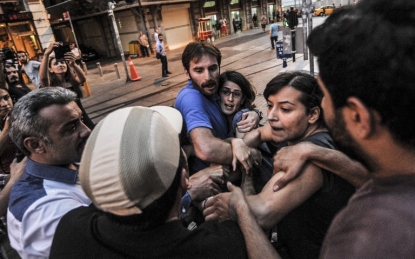 Turkish police in a stand-off with leftist protestors demonstrating against new Turkish President Recep Tayyip Erdogan in Istanbul on August 28, 2014 (AFP Photo / Ozan Kose)
Turkish police in a stand-off with leftist protestors demonstrating against new Turkish President Recep Tayyip Erdogan in Istanbul on August 28, 2014 (AFP Photo / Ozan Kose)The incident was a striking example of how “Tayyip”, as he is known to friend or foe in Turkey, divides opinion in the country. It’s hard to go a kilometre in a taxi without his name being mentioned with a curse or hailed as blessing by the driver. Arguments about his merits/defects echo out from the teahouses, breakfast salons and ferries of Istanbul.
A clash unimaginable in Russia
Such a clash, it occurred to me after the airport argument, would have been unimaginable in Russia, my previous posting up to 2014, where real political discussion is kept well out of the public sphere and President Vladimir Putin enjoys a huge popularity and control of which Erdogan can only dream. Turkey’s elections still give voters a genuine choice and the chance to boot the president and his allies out of power... if they so wish. Unlike in Russia the opposition parties in the Turkish parliament form a genuine opposition. And above all political discourse in Turkey remains open, lively and extremely volatile and arguments can blaze anywhere, from the sports club to the shopping mall to the airport.
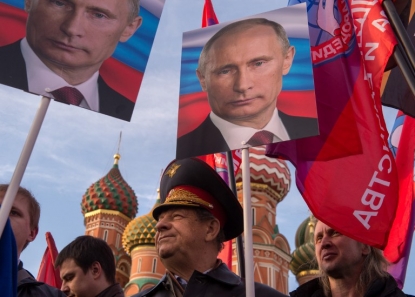 People hold placards depicting Russia's President Vladimir Putin at a rally in Moscow on March 18, 2015, to mark one year since the annexation of Crimea (AFP Photo / Alexander Utkin)
People hold placards depicting Russia's President Vladimir Putin at a rally in Moscow on March 18, 2015, to mark one year since the annexation of Crimea (AFP Photo / Alexander Utkin)I arrived in Turkey just under a year ago expecting something very different from what I experienced during five years in Putin’s Russia that started with the war in Georgia and ended with the Ukraine conflict and annexation of Crimea. The differences between Turkey’s genuinely democratic and Russia’s more authoritarian political systems are very real.
Fascinating, and troubling, similarities
But the more time I spend in Turkey, the more I am struck by the growing similarities between Turkey and Russia in the early part of the 21st century, parallels that are fascinating but also very troubling. They have become all the more telling in the run up to June 7 parliamentary elections. Erdogan, premier for over 10 years but now president, should not in theory be playing any part in the elections as head of state but the polls have become more about him than anything else.
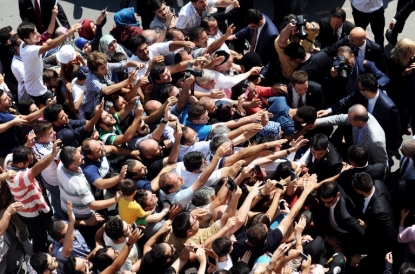 Turkish Prime Minister Recep Tayyip Erdogan (R) goes on a walkabout, on the day of the Turkish presidential election, on August 10, 2014, in Istanbul (AFP Photo / Ozan Kose)
Turkish Prime Minister Recep Tayyip Erdogan (R) goes on a walkabout, on the day of the Turkish presidential election, on August 10, 2014, in Istanbul (AFP Photo / Ozan Kose)The parallel starts of course with the leaders themselves. They both came to power around the same time (Putin was first premier in 1999, Erdogan’s party won elections in 2002 and he became premier in 2003). They restored order and prosperity in proud nations which had come close to the edge of financial meltdown - Russia in 1998 and Turkey in 2001-2002. They are both consummate modern politicians with immense charisma and an innate understanding of what their supporters want to hear, peppering their speeches with earthy phrases.
Great political strongmen
They are keenly aware of the importance of the past in countries that are the inheritor states of once powerful empires. If repeatedly winning elections was an Olympic event, they’d share the gold. They are the great political strongmen of European politics.
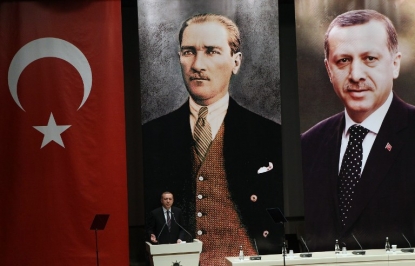 Turkey's then prime minister Recep Tayyip Erdogan delivers a speech in front of posters of himself and Mustafa Kemal Ataturk, the founder of modern Turkey, at a meeting of the ruling AKP party in Ankara on June 25, 2014 (AFP Photo / Adem Altan)
Turkey's then prime minister Recep Tayyip Erdogan delivers a speech in front of posters of himself and Mustafa Kemal Ataturk, the founder of modern Turkey, at a meeting of the ruling AKP party in Ankara on June 25, 2014 (AFP Photo / Adem Altan)But what has become so striking is how Turkey’s political landscape is beginning to resemble, in several ways, that of Russia. This is especially evident from the point of view of the media. I have been repeatedly taken by surprise over how valuable and sometimes rare a commodity reliable information is in Turkey. There are literally dozens of brightly coloured daily newspapers in Turkey offering garish headlines of all political hues. But on a given day very few carry anything more than a slanted rehash of the previous day’s news.
No inside information
Quite similar to Russia, in that the most important decisions are known to a tiny number of people close to the presidency excluding most of the Turkish cabinet, let alone the press. Almost no inside information, sourced or not, is leaked out to the media and the process of information distribution is kept highly organised and tight. You want to know what really happened when Erdogan’s loyal spy chief Hakan Fidan resigned earlier this year only to be reinstalled by the president days later? I suspect only a handful of people in this tightly-controlled country know the true story.
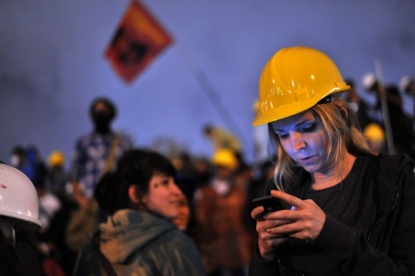 A Turkish woman reads the news on social media as she joins demonstrators at midnight in Taksim Gezi Park on June 13, 2013 in Istanbul (AFP Photo / Ozan Kose)
A Turkish woman reads the news on social media as she joins demonstrators at midnight in Taksim Gezi Park on June 13, 2013 in Istanbul (AFP Photo / Ozan Kose)Like Putin, Erdogan is ubiquitous on the television, mainly through populist speeches to thousands of people at a time across the country which he can deliver several times a day. A press conference in the normal sense is unheard of. Erdogan’s favoured method of briefing is somewhat unusual: to Turkish pool reporters, on his presidential plane on the way back from foreign trips. The comments are printed the next day always - to the disdain of pro-opposition reporters who are not allowed on the plane - with a picture of Erdogan surrounded by the accredited journalists. The president is asked the questions he wants to be asked. In a simple but telling example of symbolism, the president is always in his shirtsleeves while the male journalists keep their jackets firmly on.
Toeing the government line
Anyone with a satellite or cable collects a myriad number of news channels in Turkey but again the quantity does not lead to a choice in substantive and illuminating information. A good case in point is the well-resourced news channel NTV which is private but now increasingly toes the government line. Earlier in May, it hosted a lengthy interview with the pro-Erdogan and wildly eccentric mayor of Ankara Melih Gokcek, where the anchor sat mutely as the interviewee held forth with extremely questionable views on a variety of subjects complete with slide projections, completely unchallenged.
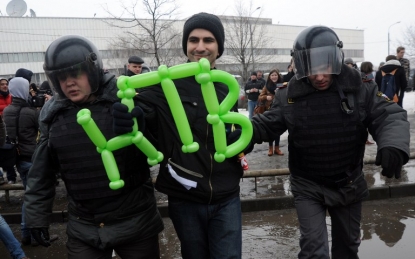 Russian riot police detain an opposition supporter carrying the letter of the NTV television channel at a protest rally in front of the broadcasting center in Moscow on March 18, 2012 (AFP Photo / Andrey Smirnov)
Russian riot police detain an opposition supporter carrying the letter of the NTV television channel at a protest rally in front of the broadcasting center in Moscow on March 18, 2012 (AFP Photo / Andrey Smirnov)Turks fondly remember the “old days” of NTV when it took a more critical line, before the anti-government protests of June 2013 which marked something of a watershed in Turkey’s modern history. Curiously, the history of Turkey’s NTV almost exactly parallels the Russian TV channel NTV of the same name (with which it has no relation). Once a blazing light for free journalism back in the 1990s, it has become more and more of a government mouthpiece since being taken over by state gas giant Gazprom, despite being a private channel with huge resources and impressively slick presentation.
Twitter and Facebook blocked
Sometimes Turkey’s control of media has even well surpassed that of Russia. I remember once when I worked in Russia a rumour spread that the government was considering closing access to Facebook and Twitter in the country. Shock and horror blazed across the “runet”.
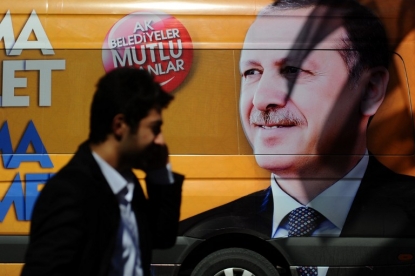 A Turkish man talks on the phone in front of a poster of Recep Tayyip Erdogan in Istanbul on March 21, 2014, after the then premier said he would eradicate Twitter in response to corruption allegations targeting his inner circle (AFP Photo / Ozan Kose)
A Turkish man talks on the phone in front of a poster of Recep Tayyip Erdogan in Istanbul on March 21, 2014, after the then premier said he would eradicate Twitter in response to corruption allegations targeting his inner circle (AFP Photo / Ozan Kose)The authorities rapidly denied. But in Turkey, access to Facebook, Twitter and YouTube has already been blocked several times in what is far from a weapon of last resort for the authorities. As are court orders forbidding the media to disclose information on a number of sensitive issues, such as the stunning claims that Turkish spy agency trucks stopped in January 2014 were in fact carrying arms bound for Syria. The number of court cases brought by the president against journalists on accusations of insulting him has grown so steeply it is impossible to cover every single instance.
Genuinely pluralist system
Comparisons can only go so far - unlike Putin, Erdogan and his Prime Minister Ahmet Davutoglu are engaged in a genuine election campaign for the June 7 polls. When Putin stood for president in March 2012, he gave just one rally during his entire election “campaign”, at Moscow’s Luzhniki stadium. Other than that, he released a newspaper article on an aspect of policy every Monday. And that was about it. By contrast, in Turkey’s genuinely pluralist system, Erdogan and Davutoglu are currently criss-crossing the country in an exhausting push for votes, sometimes giving three speeches in three different places in a single day.
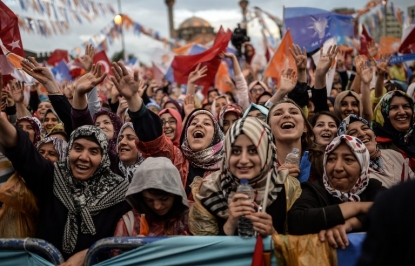 Supporters attend an election rally by Turkish prime minister and leader of the ruling AKP party Ahmet Davutoglu in Kayseri, central Turkey on May 29, 2015 (AFP Photo / Bulent Kilic)
Supporters attend an election rally by Turkish prime minister and leader of the ruling AKP party Ahmet Davutoglu in Kayseri, central Turkey on May 29, 2015 (AFP Photo / Bulent Kilic)But it’s impossible not to notice how the posters of the ruling party vastly outnumber those of the opposition in the campaign. At the moment you can’t go very far in Istanbul without bumping into, round about moustache level, a gigantic blow-up of Davutoglu’s face beneath a policy pledge in big letters. In the last weeks, Davutoglu and Erdogan have staged tightly choreographed rallies mustering tens of thousands of people in shows of political might of Soviet proportions.
And it’s escaped no one that at this point in time relations between Turkey and Russia have flourished in an unlikely alliance that turns a blind eye to disputes on the Syria and Ukraine crises. The two sides are planning to build a new gas pipeline beneath the Black Sea and in one of the biggest Turkish infrastructure projects of recent times, Russia is building Turkey’s first nuclear power plant.
Is Turkey being Putinized? Not quite. But there are signs in that direction.
Stuart Williams is AFP’s deputy bureau chief in Istanbul
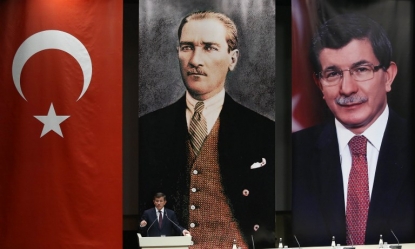 Turkish Prime Minister Ahmet Davutoglu delivers a speech below portraits of himself and Mustafa Kemal Ataturk, the founder of modern-day Turkey, in Ankara on May 20, 2015 (AFP Photo / Adem Altan)
Turkish Prime Minister Ahmet Davutoglu delivers a speech below portraits of himself and Mustafa Kemal Ataturk, the founder of modern-day Turkey, in Ankara on May 20, 2015 (AFP Photo / Adem Altan)

